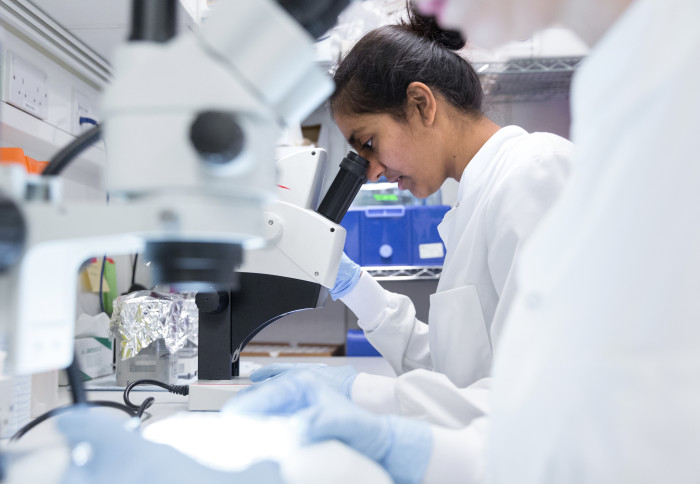How MRes in Cancer Technology can lead to a bright and multidisciplinary career

Dr Sam Au discusses the new MRes in Cancer Technology course by the Department of Bioengineering in partnership with the Institute of Cancer Research.

Can you introduce yourself and your research?
My name is Dr Sam Au and I’m a lecturer in Bioengineering at Imperial College London. I am trained as an engineer and my research group develops microfluidic and organ-on-chip platforms to understand and combat cancer metastasis. We design these platforms to mimic components of the human body such as blood vessels, which allows us to accurately explore cancer behaviour without having to resort to animal experimentation. My collaborations with cancer biologists and clinicians have been a tremendous learning experience and I hope to provide others with these opportunities as well.
Can you give us a short introduction to the MRes Cancer Technology course?
The MRes in Cancer Technology is a new research-intensive Masters programme with an innovative approach to multidisciplinary cancer research. The highlight of the MRes is a 9-month full-time research module where students apply engineering, physical sciences or mathematics to address important unmet needs in cancer research and management by spending time in at least two complementary laboratories at Imperial College London or the Institute of Cancer Research.
What makes this MRes course stand out?
We believe that engineering, physical sciences and mathematics have a vital role in cancer research, and we need to train the next generation of minds to work effectively at these interfaces. The MRes was therefore crafted around this central ethos - from our multidisciplinary research projects to diverse lectures from leading clinicians and scientists.
What kind of skills or attributes should candidates have before starting?
Students should have foundational training or relevant experience in any area of engineering, physical sciences or mathematics. Interest in cancer research or management is a key attribute, but prior expertise is not required. Students will be taught the fundamentals of cancer and key challenges in the field through the comprehensive Bioengineering Approaches to Cancer module that is taught by myself in the first term.
What type of multidisciplinary research is available in the field of cancer?
A great advantage of our institutions is the tremendous diversity of research being conducted here. We have engineering, physical sciences and mathematics groups who specialise in organ-on-chip development, imaging, nanoparticle research, molecular detection, robotics, computational modelling, artificial intelligence, working alongside cancer researchers in areas including cancer immunotherapy, radiotherapy, drug discovery/delivery, surgery, cell biology and precision medicine. This is just a small sampling of cutting-edge multidisciplinary cancer research being conducted at our institutes however, and many great advances may come from combinations of unexpected research areas.
Why should students study this MRes?
One of the main reasons the Department of Bioengineering developed this programme was that many of our graduates told us that they felt confident in their engineering abilities, but either felt unprepared to apply their skills to the complex disease of cancer or were unsure about what aspects of cancer most interested them. The MRes addresses both of these concerns by training students to understand the fundamentals of cancer and providing an opportunity to delve into cutting-edge multidisciplinary cancer research.
Why do you have a partnership with the Institute of Cancer Research?
Our strategic partnership with the Institute of Cancer Research improves the depth and breadth of training we can provide and will provide more choices in available research projects. For example, lectures will be delivered from clinicians who work directly with patients in hospital settings and this will provide unique insights into future challenges associated with cancer. The Institute of Cancer Research has a long history of breakthroughs in the field of cancer including the discovery of carcinogens, identification of BRCA2, discovery of N-RAS and the development of numerous drugs.
What are the career prospects for someone with an MRes in Cancer Technology qualification?
The programme will equip students to work effectively in many diverse areas of cancer. For instance, students will be well-prepared for multidisciplinary PhD programmes such as the CRUK-funded Convergence Science PhD programme at Imperial and the Institute of Cancer Research. We have also received interest from advisors at pharmaceutical and medical device industries in employing our graduates due to their unique skillsets.
Want to study with us?
Find out more on our Department of Bioengineering page.
The College's Graduate School is at the centre of the postgraduate community and provides details on what studying at Imperial is like.
Current and prospective students can view a wide selection of answers to frequently asked questions on the College's regularly updated COVID-19 webpages.
Article text (excluding photos or graphics) © Imperial College London.
Photos and graphics subject to third party copyright used with permission or © Imperial College London.
Reporter
Murray MacKay
Communications Division
Miss Kemi Aofolaju (she/they)
Department of Bioengineering